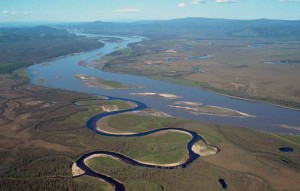A dispute between an Alaska boater and the National Park Service will be heard by the highest court in the country this week on Wednesday, Jan. 20. Lower courts have rejected Anchorage resident John Sturgeon’s suit challenging Park Service authority to regulate Alaska rivers, where they pass through federal conservation units.

John Sturgeon’s journey to the Supreme Court started during a September 2007 trip in the Yukon-Charley Rivers National Preserve, where he says he’s long hunted moose.
“Out of Eagle on the Yukon River since 1971, and I’ve hunted very year consecutively there since that time… So just the area, I’ve always hunted.”
Sturgeon recounts being stopped on the banks of the Nation River in the preserve, making repairs to a small hovercraft, when rangers showed up and informed him hovercrafts were illegal to operate in federal parks and preserves.
“I never thought, I never dreamed, that I’d because of that incident I’d be standing in front of the U.S. Supreme Court, the highest court in the land, and a moose hunter going to the Supreme Court in Washington, D.C., is actually pretty incredible.”
Sturgeon challenged the hovercraft ban, contending that Alaska’s navigable waters are state-owned and do not fall under federal jurisdiction. Sturgeon describes his argument, which is backed by the state of Alaska, as about government overreach and violation of the 1980 Alaska National Interest Lands Conservation Act, or ANILCA, that created numerous Alaska parks and preserves.
“There’s language for example that mandate that motorized boats are allowed, that snowmachine access, that hunting is allowed, that subsistence is going to be encouraged.”
Legally, the case boils down to a single section of ANILCA, 103-C. It says nonfederal land within a conservation unit isn’t subject to rules meant solely for the surrounding federal lands. To Sturgeon, it’s straightforward: State property is exempt from Park Service rules, but the lower courts read it to mean that state land is exempt only from Alaska-specific Park rules. The Ninth Circuit Court of Appeals concluded the hovercraft ban applies, because it’s a nationwide rule, not crafted just for an Alaska park.
The broader issue of who controls river waters is also complicated.
“Neither the state or the federal government owns the water overlying state owned submerged lands, the water is actually subject to both federal and state jurisdiction.”
Katie Strong is an attorney with Trustees for Alaska, which is representing numerous conservation groups as friends of the court in the Sturgeon case. ANILCA specifics aside, Strong underlines that the case is about more than one person’s hunting tradition.
“While Mr. Sturgeon is only one hovercraft user, multiple people could be using hovercrafts in a popular park like Denali, that really impacts the visitor experience.”
Sturgeon agrees that the case isn’t just about him, but holds firm on Alaskans’ right to freely ply state waterways even where they traverse federal parks and preserves.
“This is a 100 percent public interest lawsuit. It’s not like if I win I’m gonna get a citation back or fine back or something.”
Sturgeon, is traveling to Washington, D.C., for Wednesday’s Supreme Court hearing. His attorneys have been there for a week preparing. Sturgeon’s case has made it farther than that of another Alaska boater who challenged NPS authority on Alaska Rivers. Central resident Jim Wilde unsuccessfully appealed federal misdemeanor charges stemming from a 2010 run in with Yukon Charley Preserve rangers trying to conduct a boat safety check
Dan Bross is a reporter at KUAC in Fairbanks.




